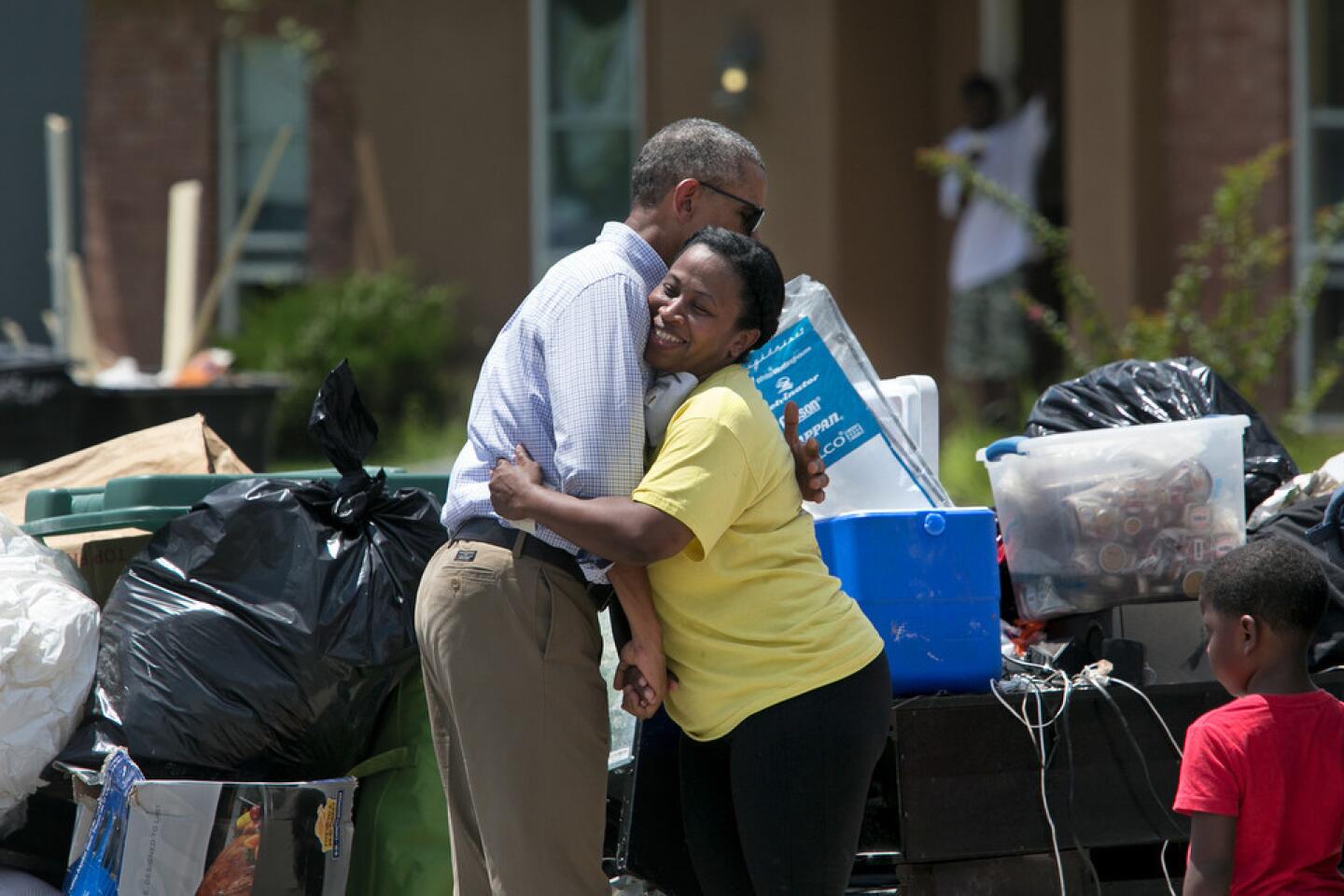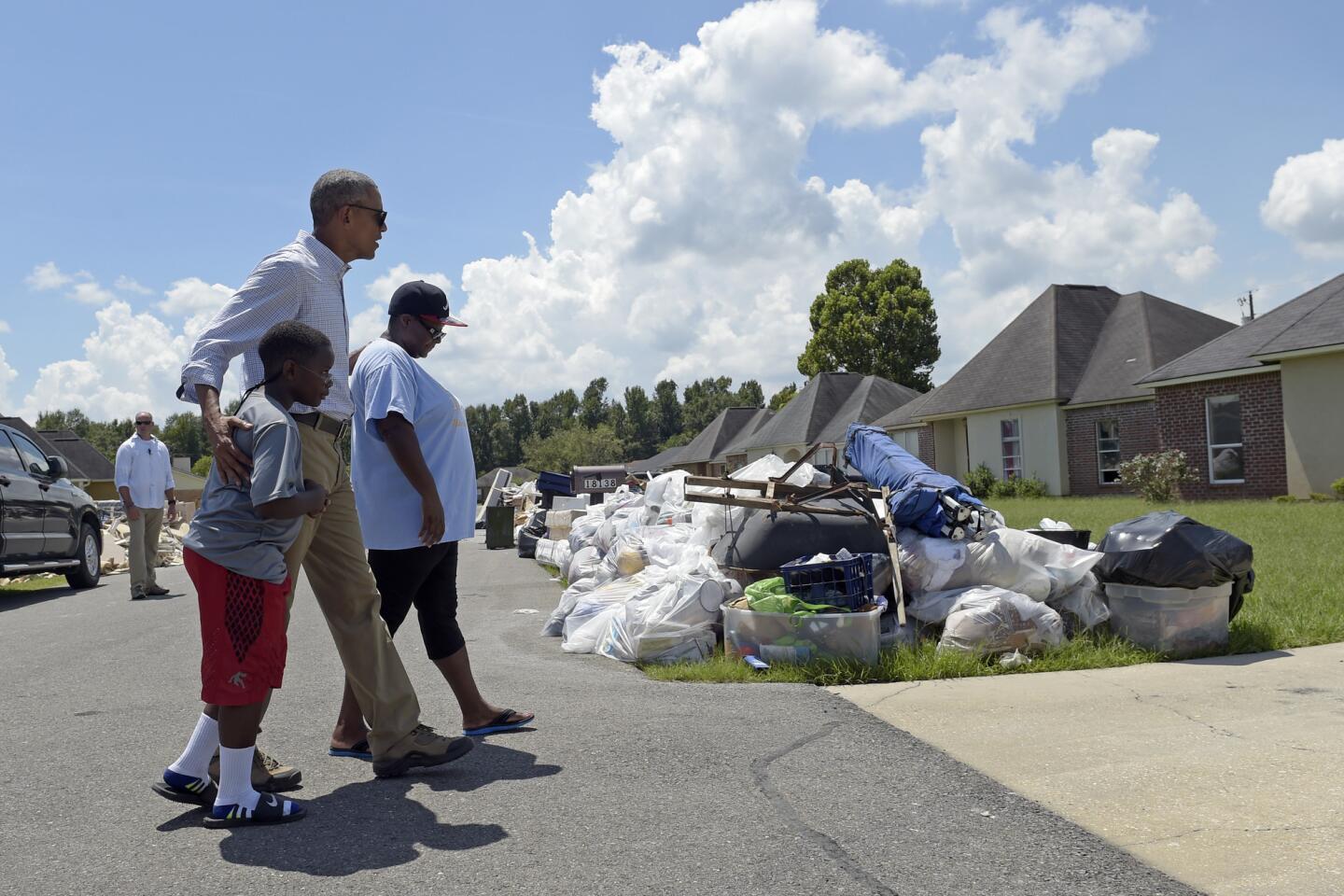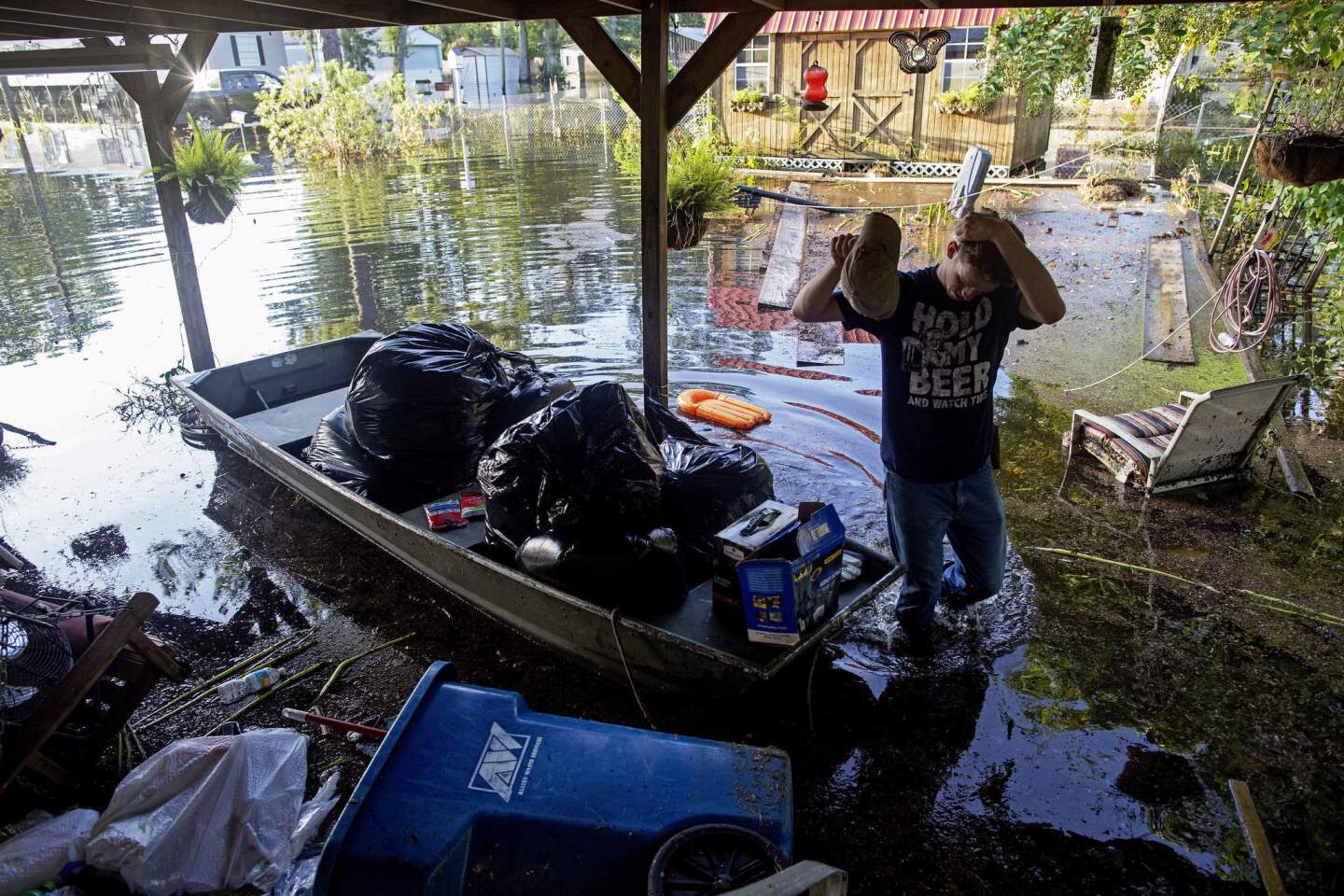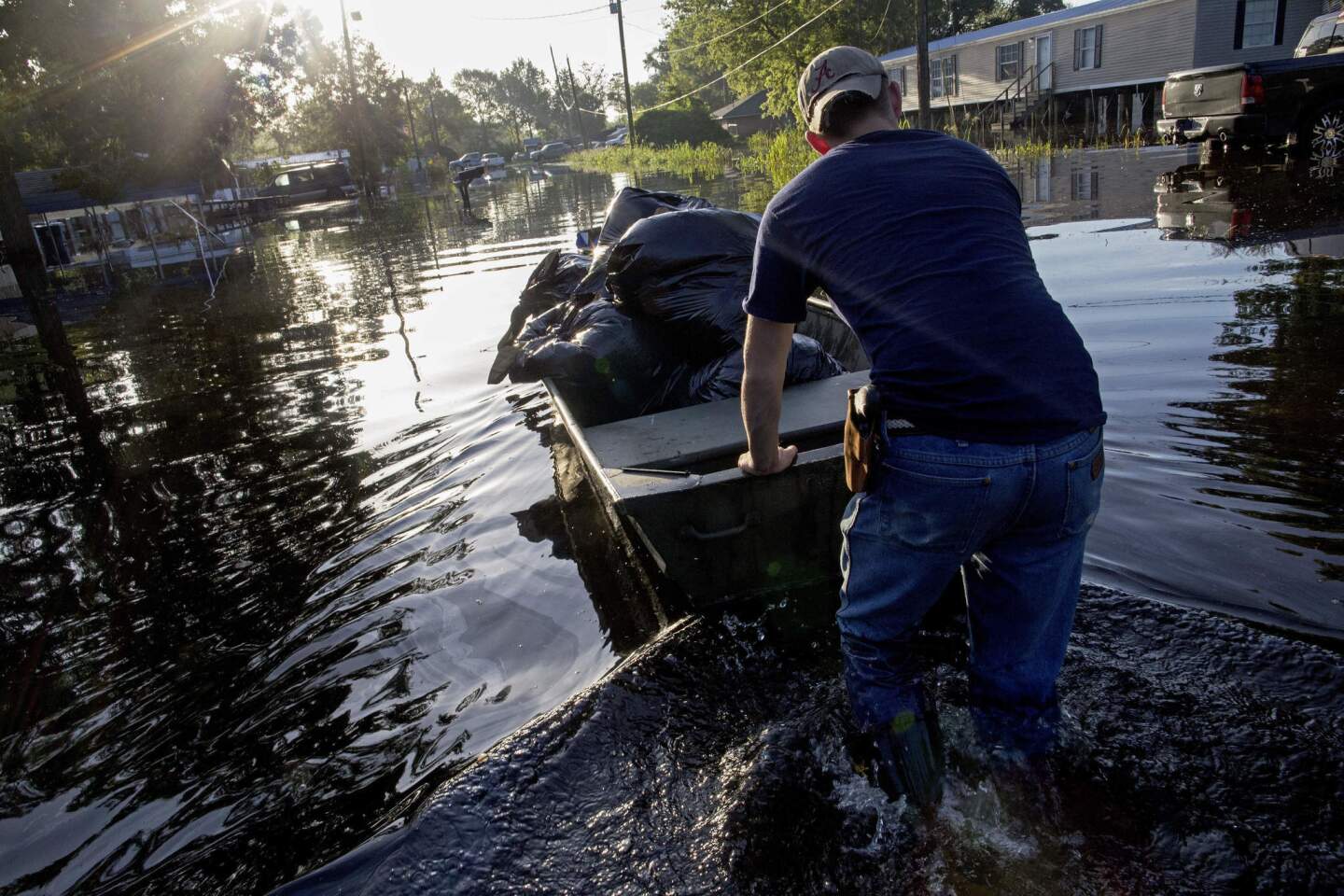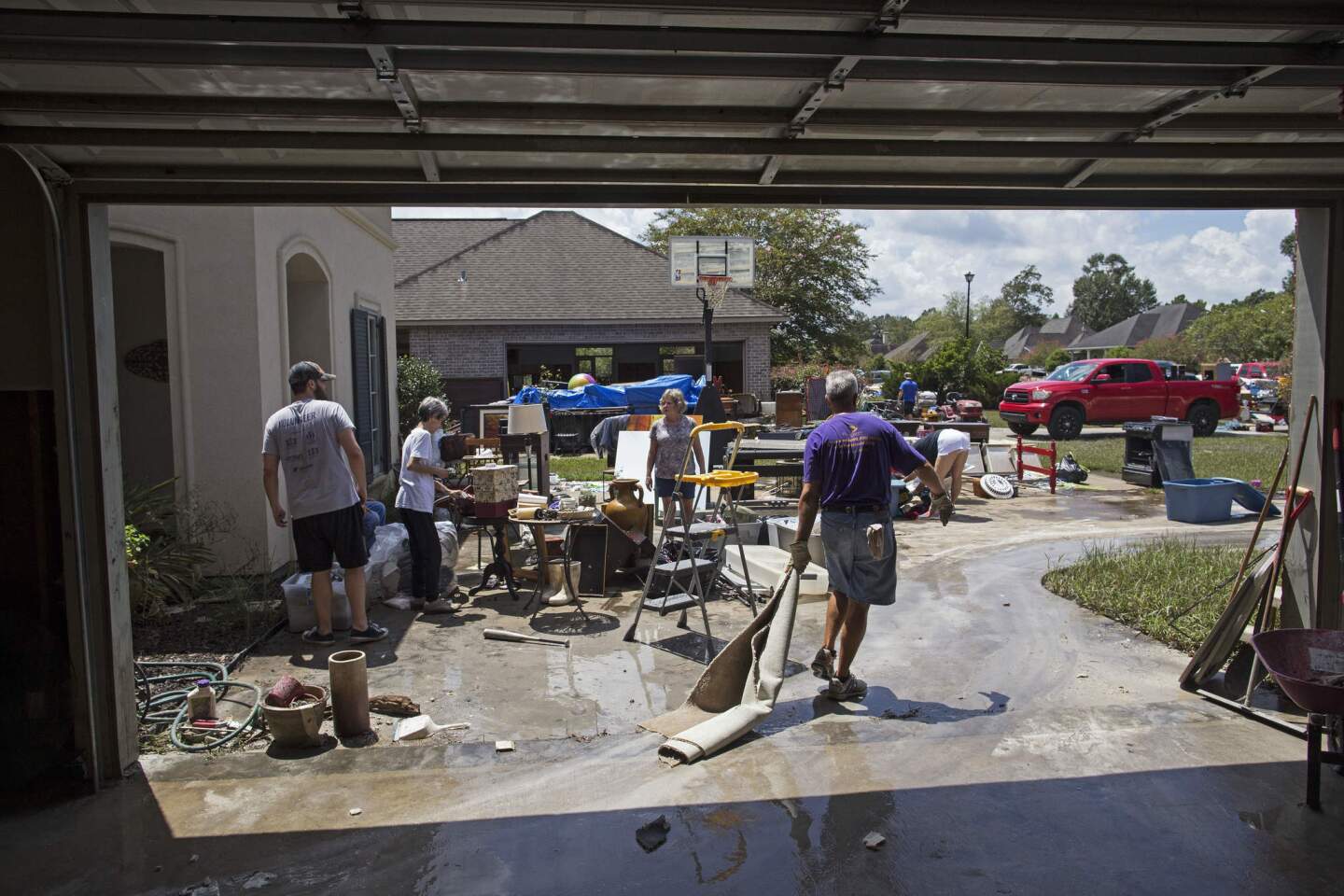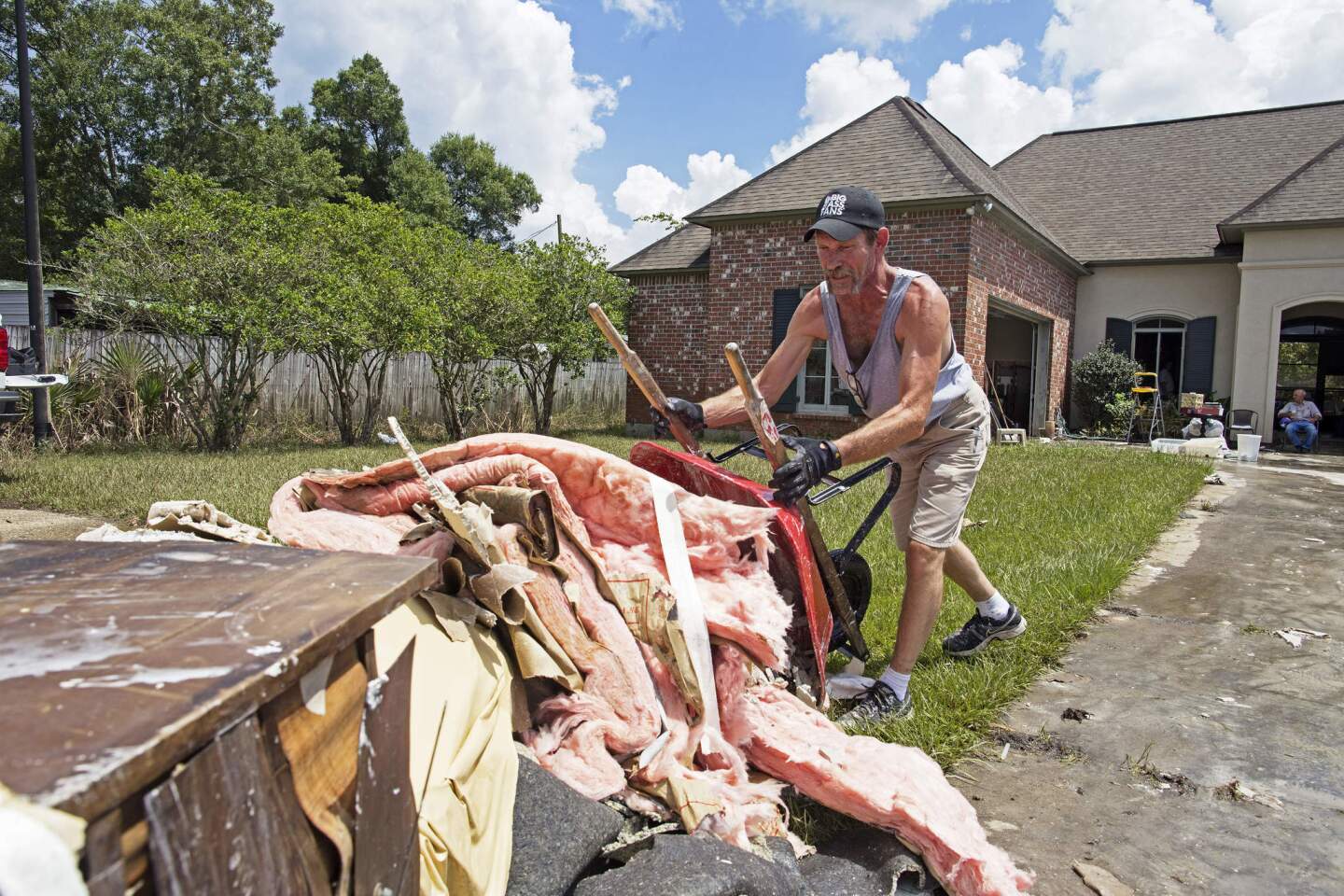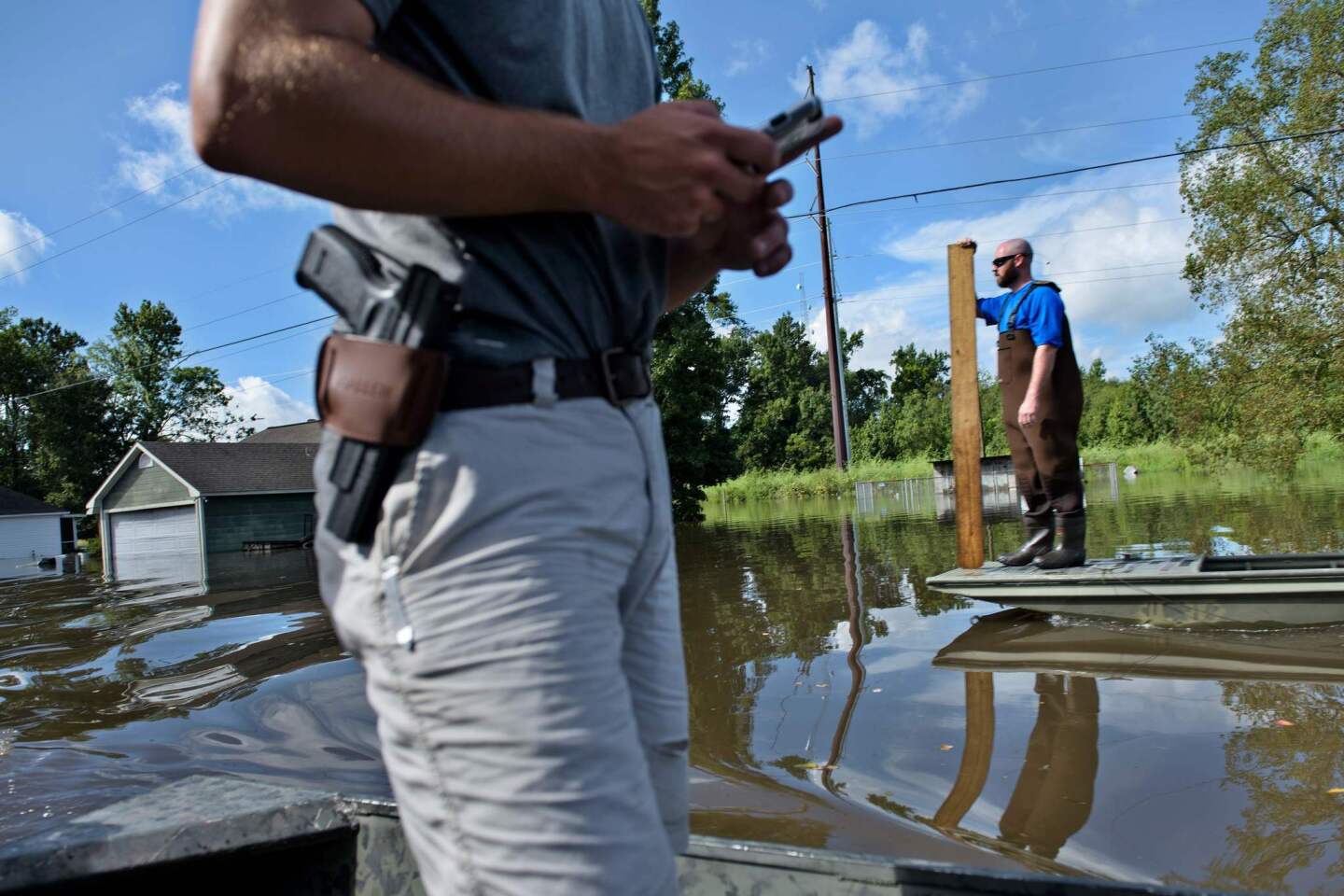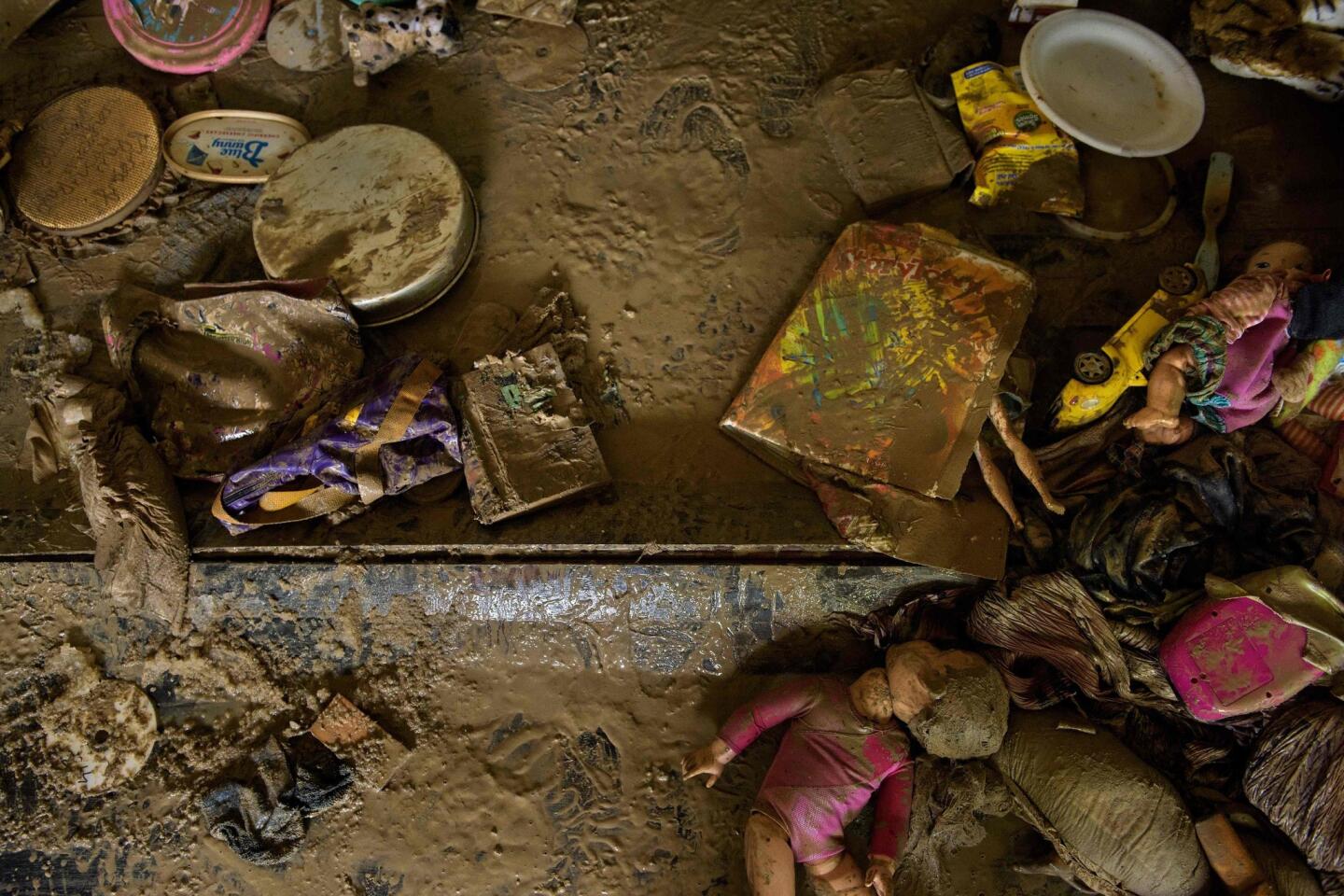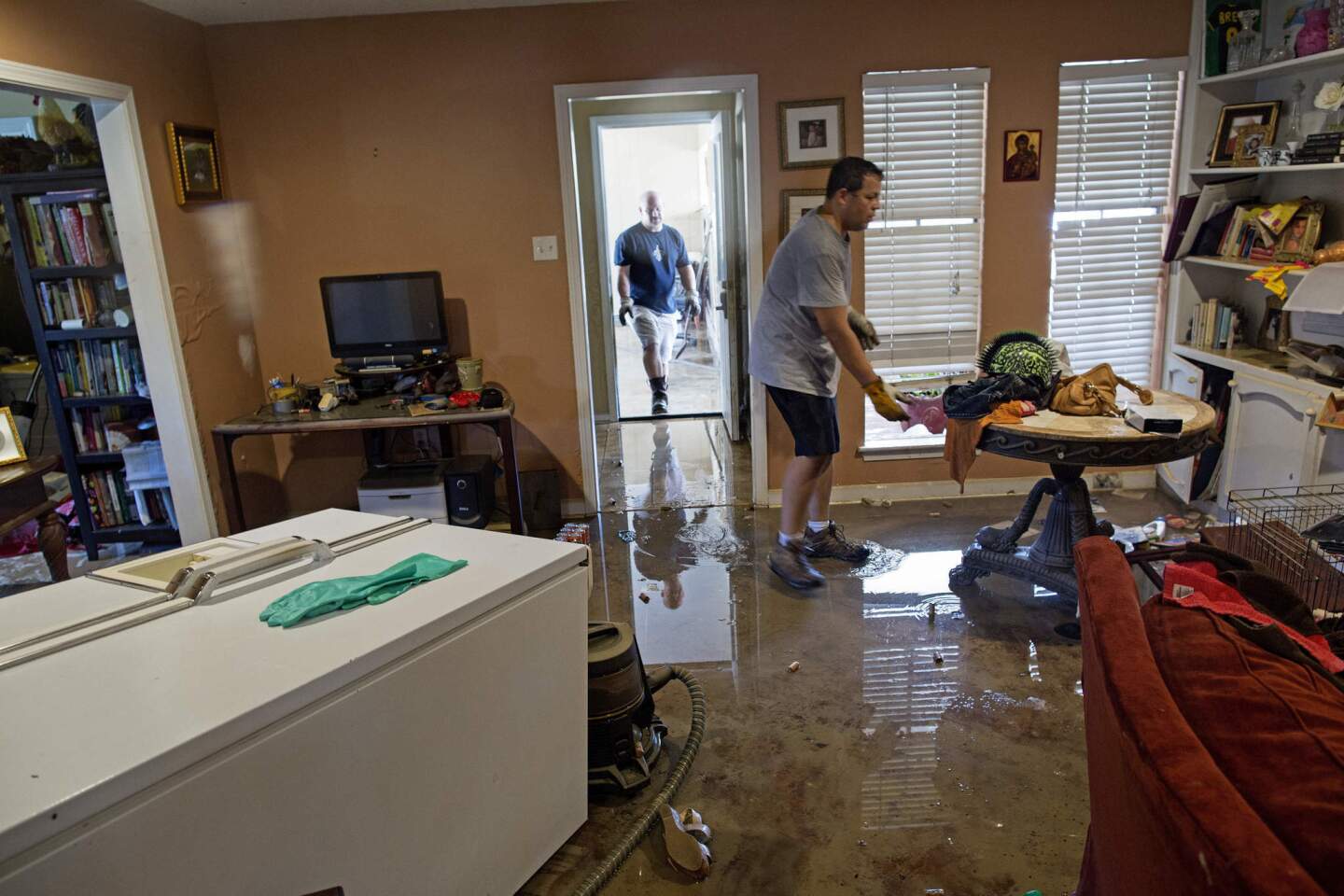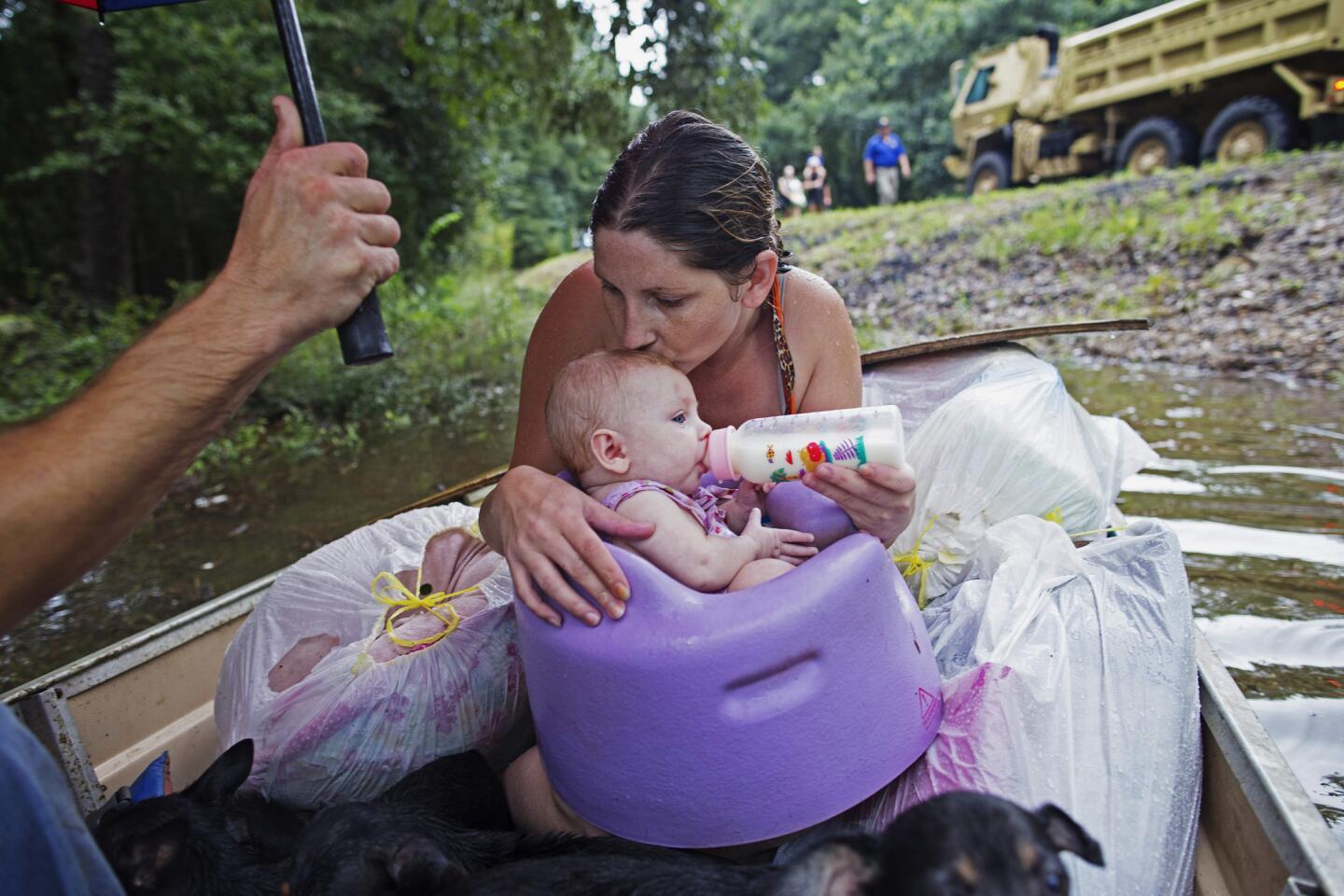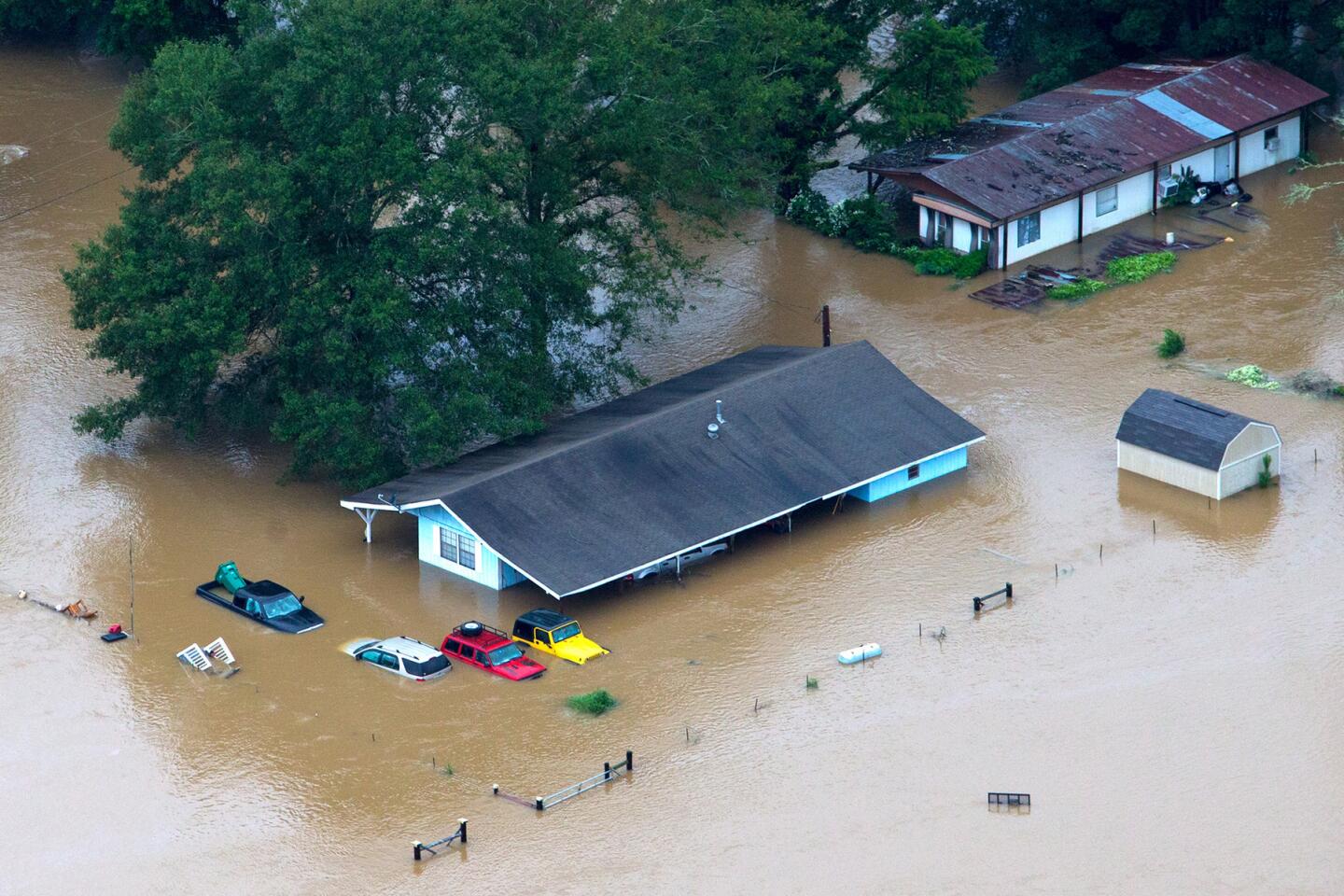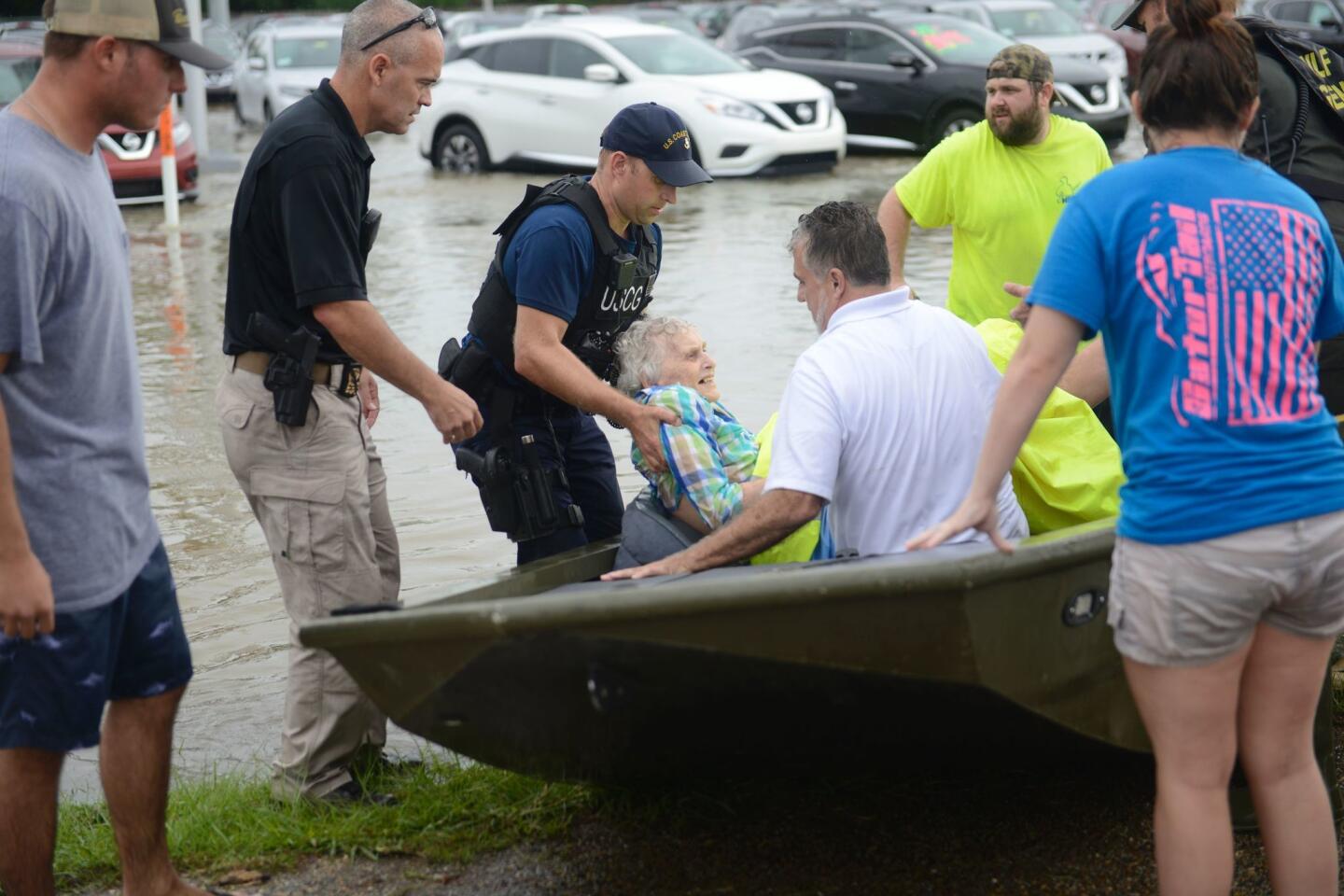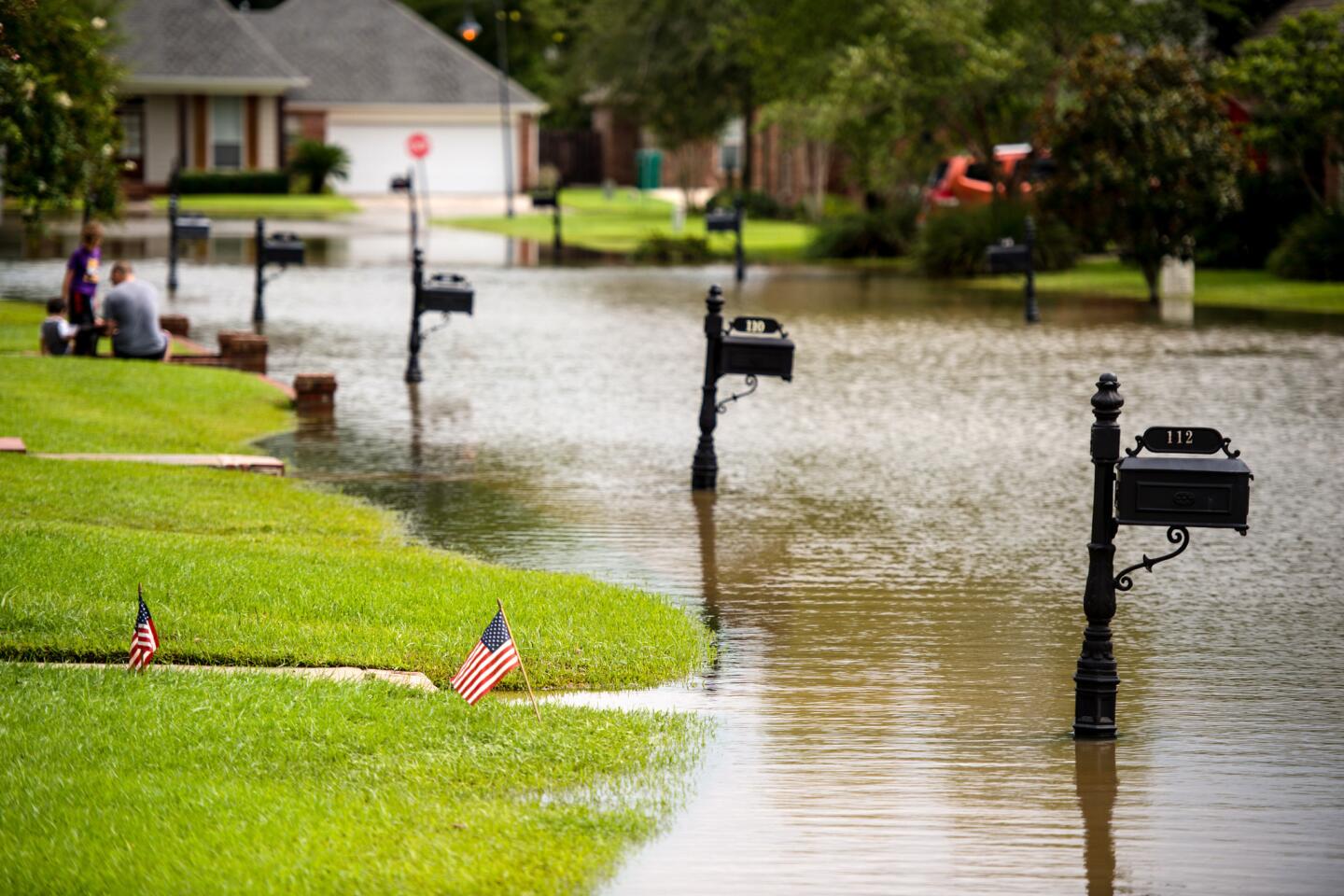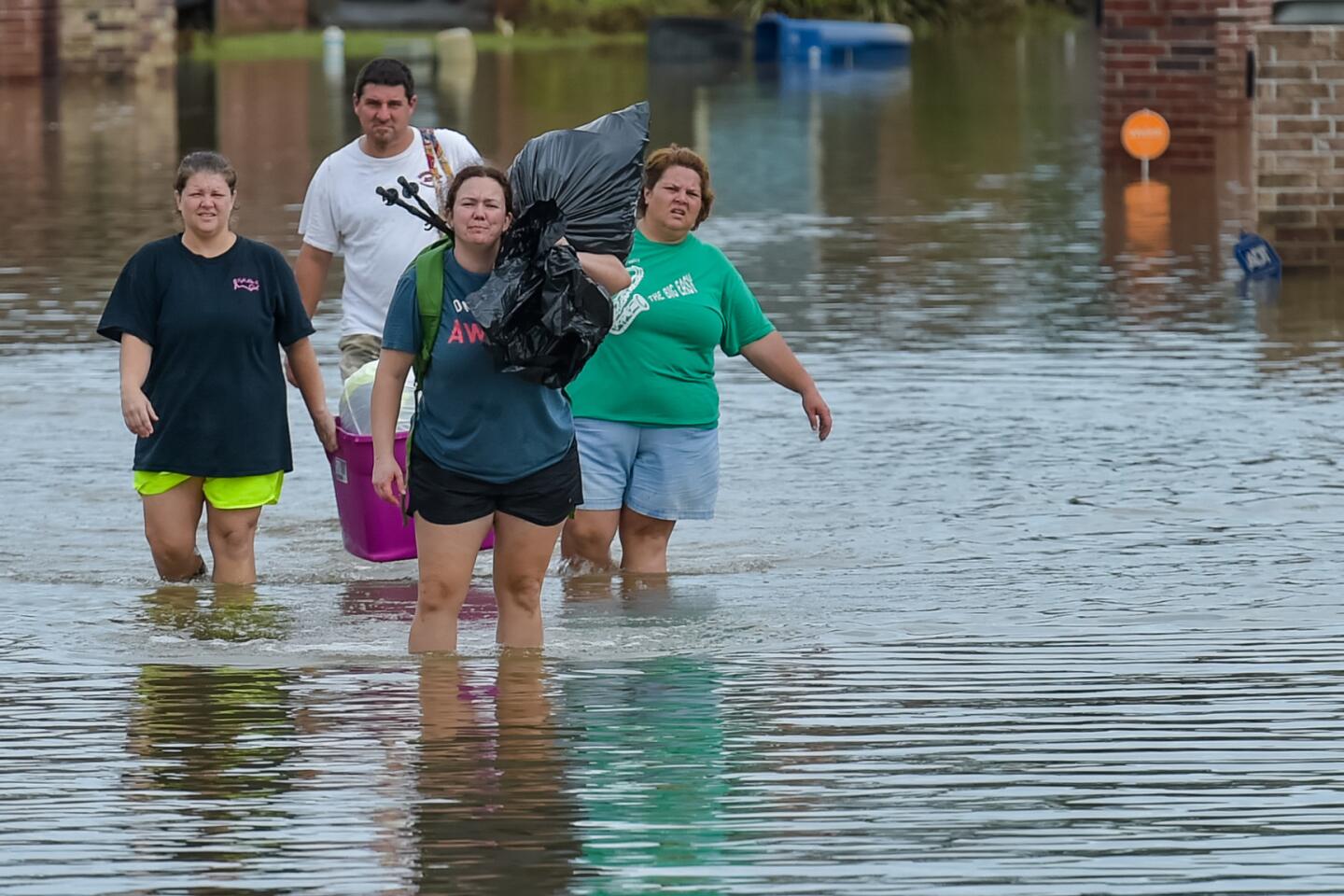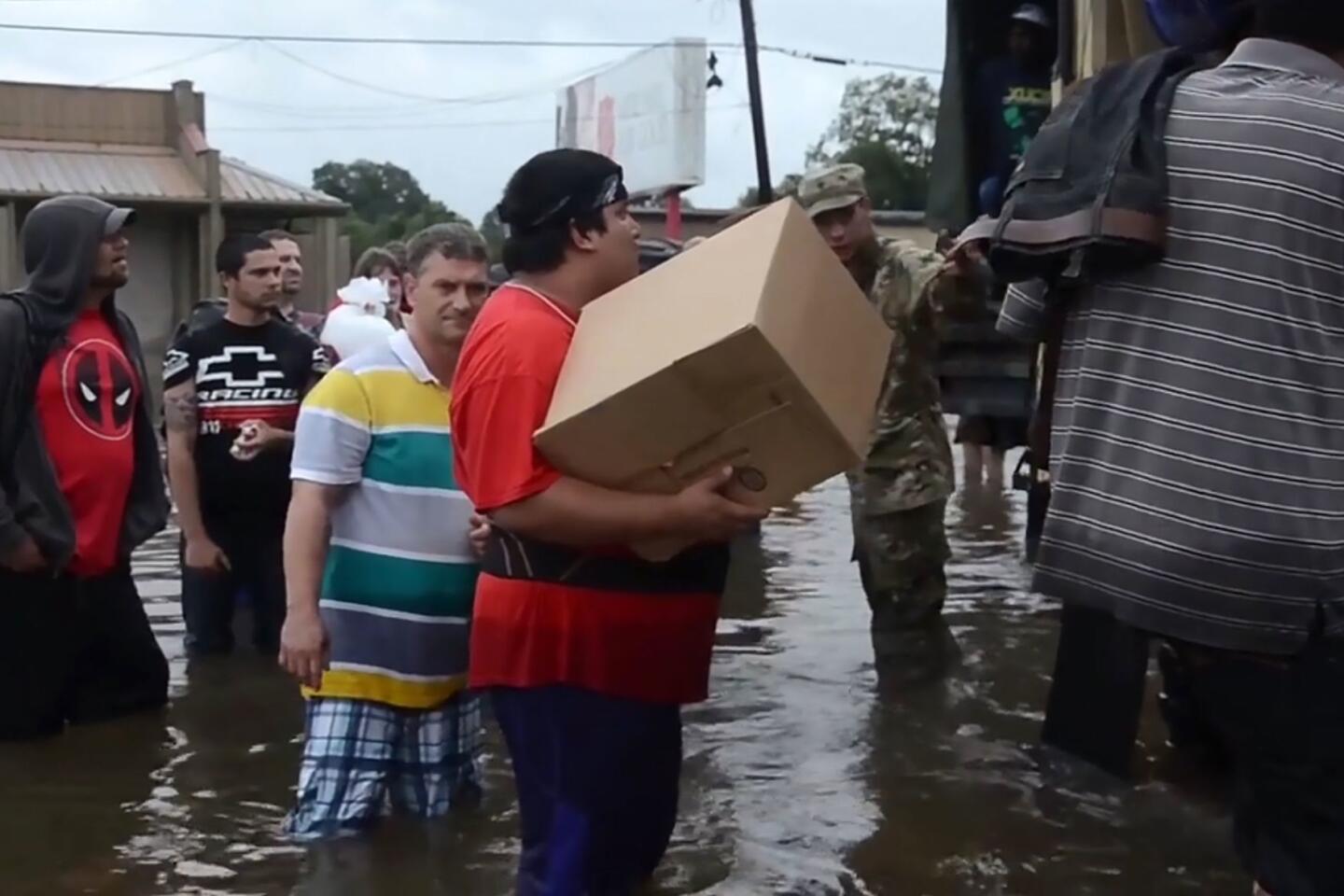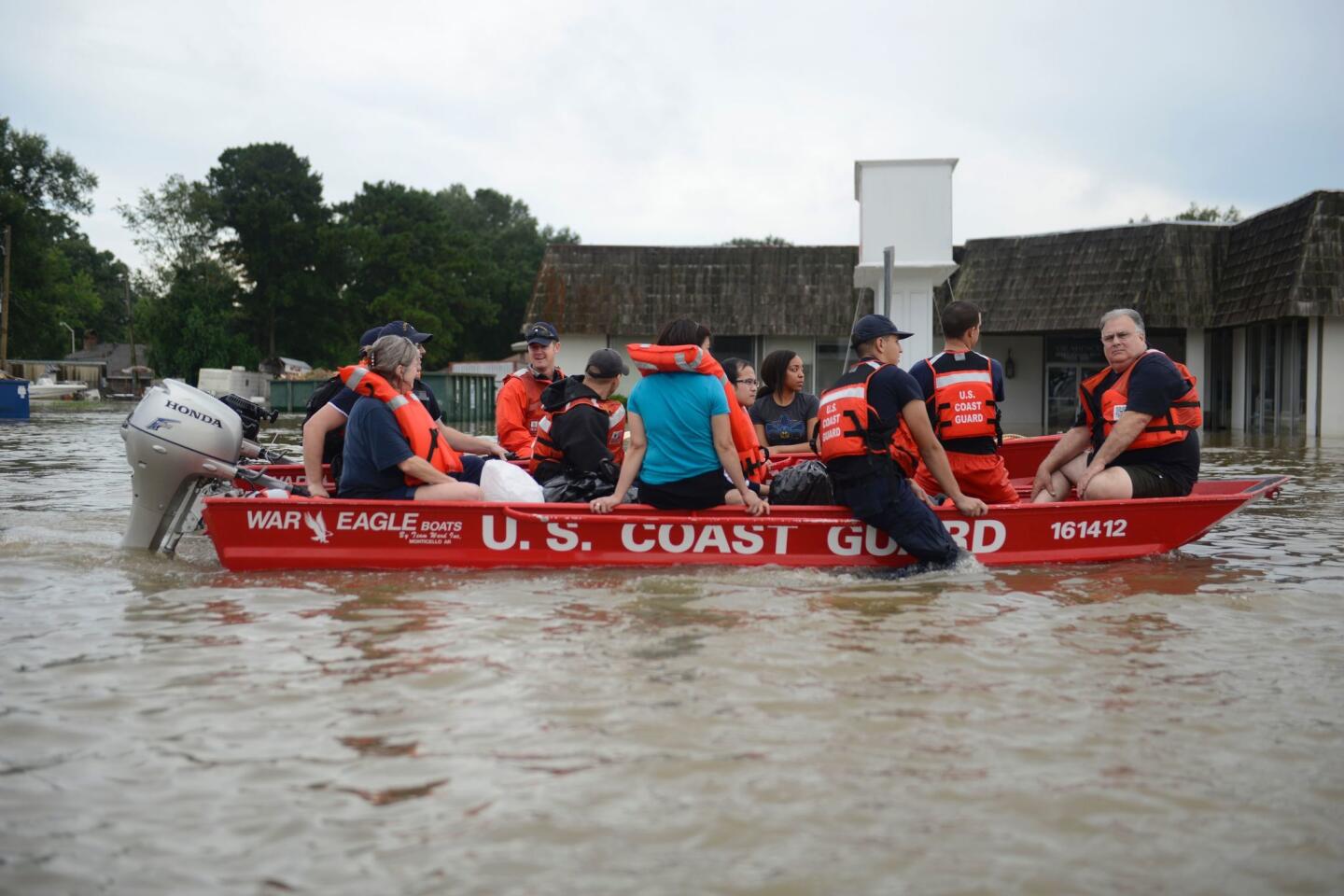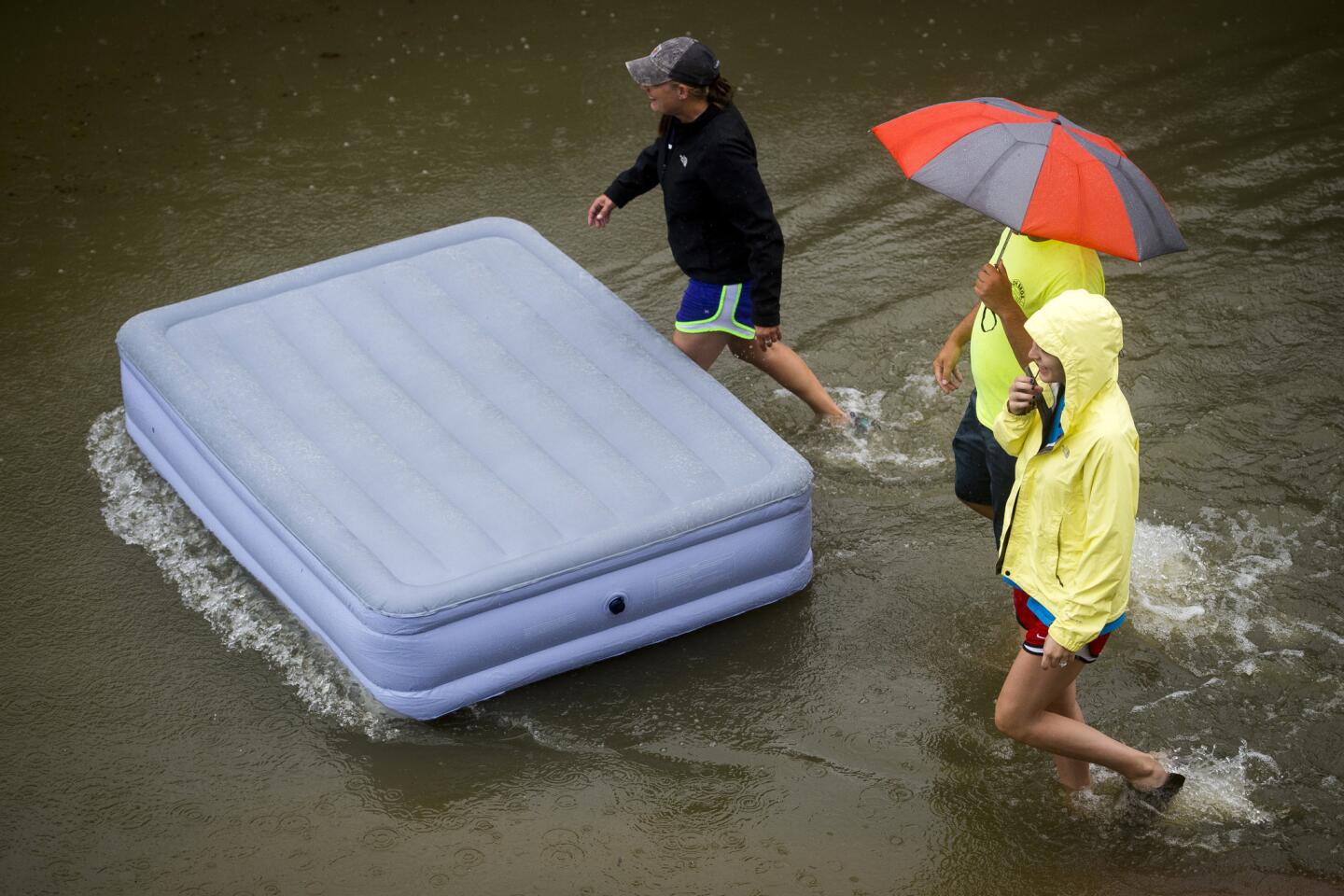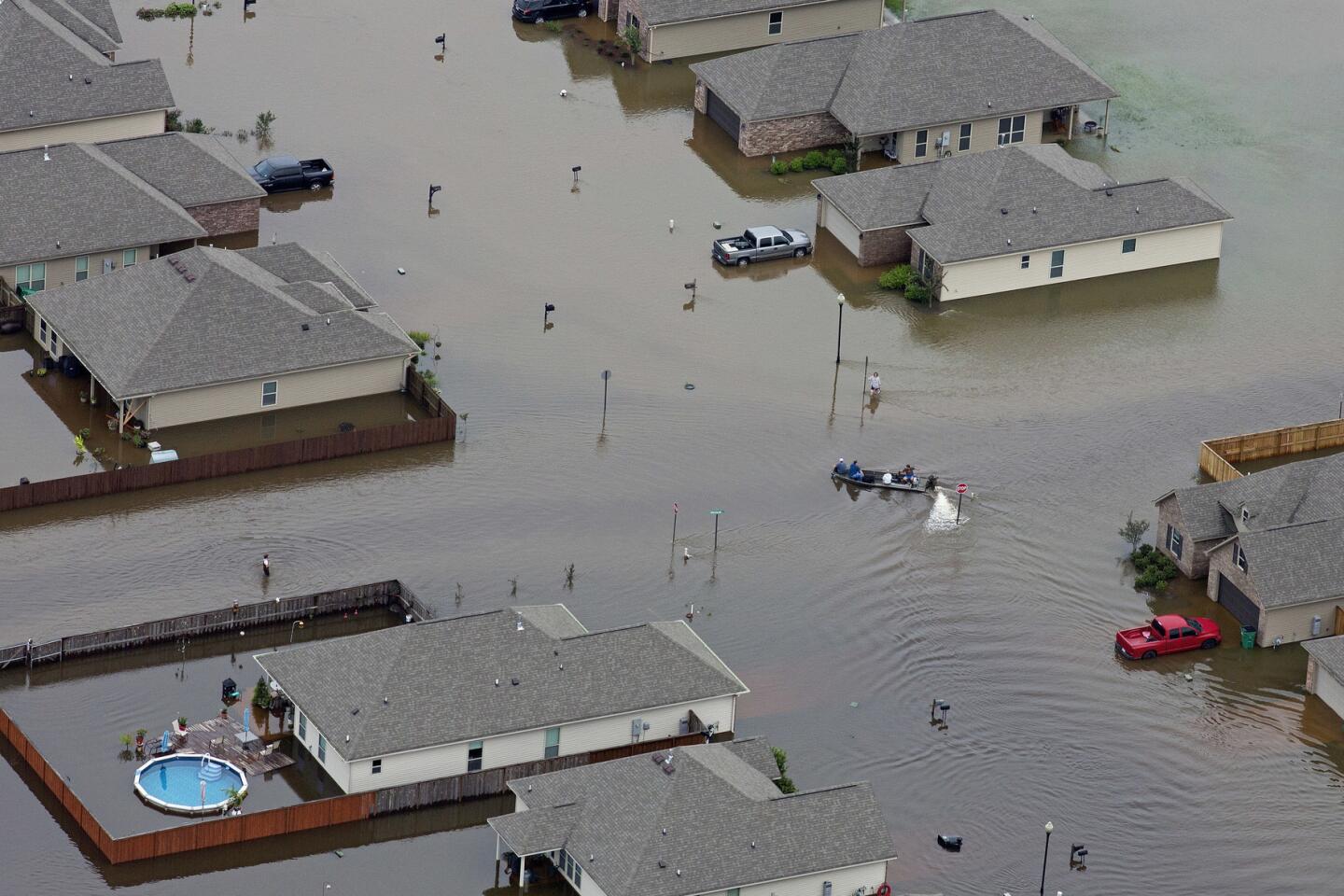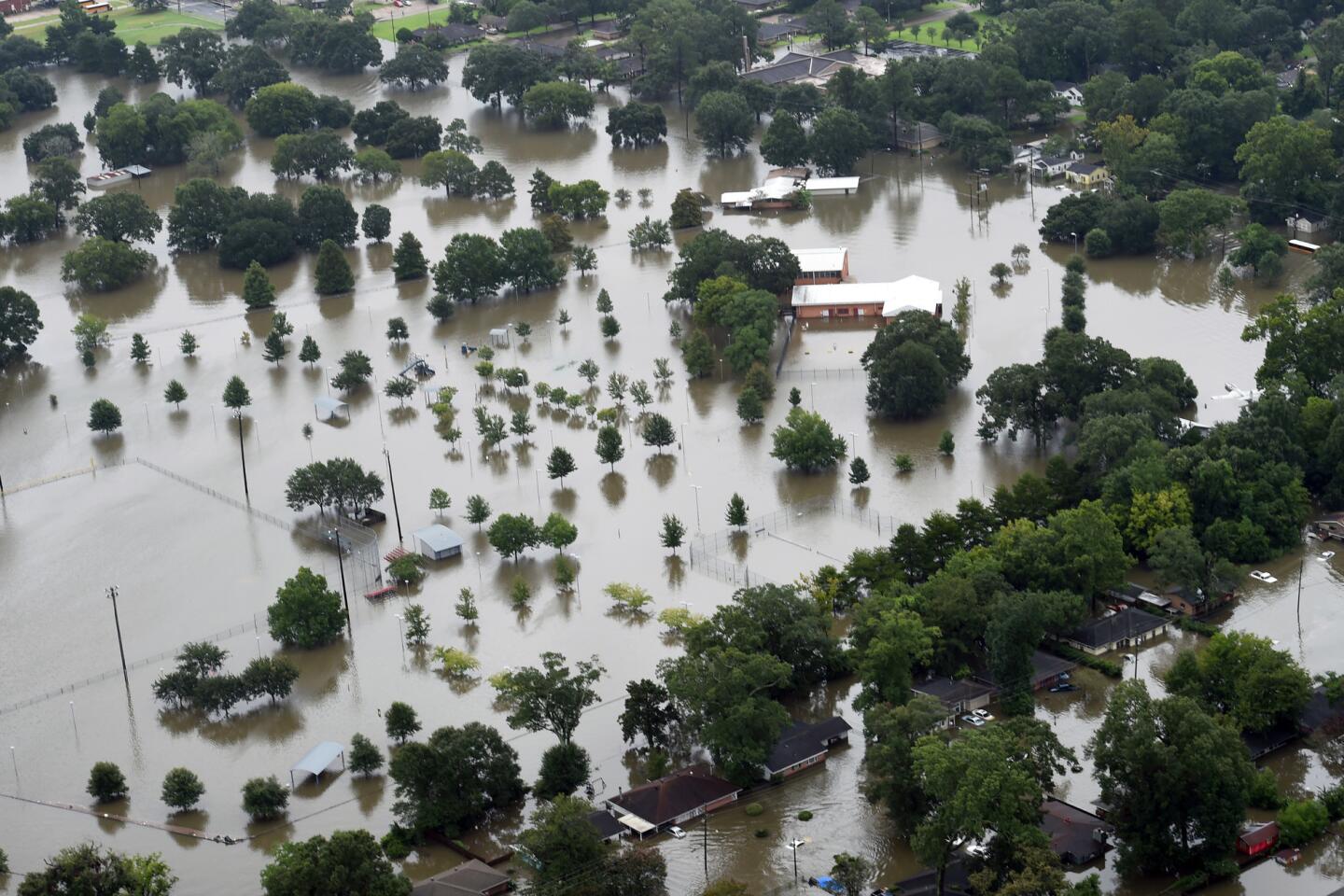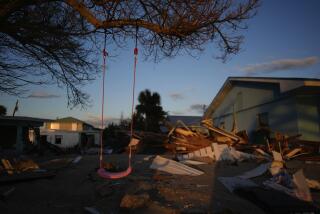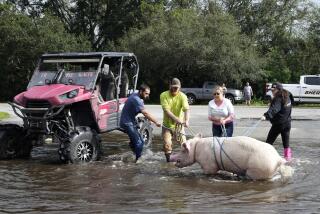In a flooded Louisiana parish, a 3-mile journey down the river to answer the question: Did our house survive?

Across Louisiana, residents are returning to their flooded neighborhoods, anxious but hopeful their homes made it.
Reporting from french settlement, la. — The little blond girl in striped rubber rain boots and a bright pink shirt knew things could be bad at the house she shared with her grandparents. Floodwaters had consumed much of their Baton Rouge suburb, and some of her classmates’ homes had water to the roofs.
“If my house has water in it, I’m pretty sure my room has water,” said 11-year-old London Guidry as she clambered aboard a small motorboat to check the family ranch house with her grandfather and his friend and fellow riverboat pilot, Josh Boogaerts.
The sun was high, the air sultry as they set off Wednesday afternoon into the storm-swollen Amite River beneath a canopy of cypress and oak. Muddy eddies swirled around them.
“How bad is the current?” London asked, wide-eyed.
“Y’all are all gonna see firsthand in just a second,” Boogaerts said as the aluminum boat cruised past a submerged street sign and thudded against something as he muttered, unfazed, “mailbox.”
Similar scenes are playing out across the state’s eight Florida Parishes, part of a former Spanish colony clustered to the east of the Mississippi River. Residents are returning to waterlogged neighborhoods wondering whether their house survived. London and her grandfather, Dugan Phillips, would get their answer after traveling three miles downriver.
Fatal flooding unleashed by record rains crept this week from Baton Rouge to suburbs like French Settlement in Livingston Parish. A dank tide of murky swamp water destroyed up to 80% of the homes of the parish’s 140,000 residents and left others gutted, smelling of dead fish.
So far, 13 people have died. Two feet of rain fell in a 24-hour stretch, swelling the Amite beyond its banks and breaking a rainfall record set in 1962. More than 70,000 people have registered for Federal Emergency Management Agency assistance; more than 9,000 have filed flood insurance claims.
“This is biblical,” Boogaerts said as he steered the boat, gesturing to the submerged home of a friend.
“He’s burnt out. He’s done. He just put in a new game room,” Boogaerts said of the friend, whose Camaro also was flooded.
They passed two men in another small boat, and Phillips, recognizing a neighbor, waved and shouted, “Good luck to you guys!”
They soon floated toward Boogaerts’ own house, two stories tall and pale pink. Water had swamped the first floor and a shed packed with equipment.
“The bottom of my floor joists are gone. It’s unsellable,” the 43-year-old father of two said, haggard and unshaven after days of these trips. He said he plans to leave: His wife can’t stand the risk on the river.
“All she has to do is hear French Settlement and flooding in the same sentence, and she’s gone. Last time, she left the dog on the chain,” he said. “I just can’t keep dumping money into it. But it’s breaking my heart to leave here.”
See the most-read stories this hour »
Floodwaters washed out nearby interstates, closed more than a dozen parish schools indefinitely, opened graves and cut off this and other bayou communities for days. Gas and other staples were scarce in the village that claims to be the region’s capital for “sauce patate,” Cajun potato stew. The governor deployed the National Guard, but sometimes even the guard’s heavy equipment became mired in bayou muck.
Stranded locals summoned their own “Cajun navy” (T-shirts now available online) — hundreds of volunteer boaters like Boogaerts who aided law enforcement in rescuing more than 15,000, many from attics and rooftops. They also delivered donated sausage to a shelter at St. Joseph Catholic Church.
The makeshift donation center, soup kitchen and shelter refused to close its doors even when the electricity and air conditioning failed, with volunteers still serving up pastalaya (jambalaya with pasta), gumbo, red beans and rice. Father Jason Palermo, a police chaplain who carries his gun in an ankle holster, coordinated shipments of water and other supplies.
“Town hall is waist-deep,” Mayor Toni Guitrau said as she stopped by the church to check on relief efforts after cleaning her own home, which flooded. She said her daughter, a sheriff’s deputy, was on “looter patrol.”
The village was settled in 1809 as part of a Spanish land grant, and sawmills soon sprouted to process local cypress. A descendant of those pioneers, 64-year-old Dale Aydell, was among those waiting to get back to his house on Goodtimes Road, once home to Goodtimes Sawmill. The water in his home was waist-deep — not much of a good time, he added. There once was a Hardtimes Sawmill here too.
“I can’t get in until probably tomorrow,” he said.
The village’s volunteer fire chief said he expects to see more rescues later this week. Livingston Parish President Layton Ricks, whose home in Denham Springs flooded, had to be boated back to his house to pick up blood pressure medication.
Ricks has met with the governor and federal emergency management officials, who he said have started assessing damages.
FEMA is a concern here, where many feel the agency bungled the Hurricane Katrina response. So many resettled here after Katrina, a subdivision was nicknamed “St. Bernard” after their New Orleans-area parish, Ricks said.
Out on the river, London, Phillips and Boogaerts had almost ended their journey. London covered her eyes. She couldn’t look.
Then, as the boat neared a white house with dark green shutters, the girl squealed.
“Our trampoline is still there!”
Phillips’ heart also leaped. The water had reached only their porch.
“It’s completely dry. Yes!” London shouted as she scaled the front railing.
“Well, not completely dry, baby. We’ll see,” said Phillips, 61, sounding tired as he added, “The wife was hoping to get a new floor out of this.”
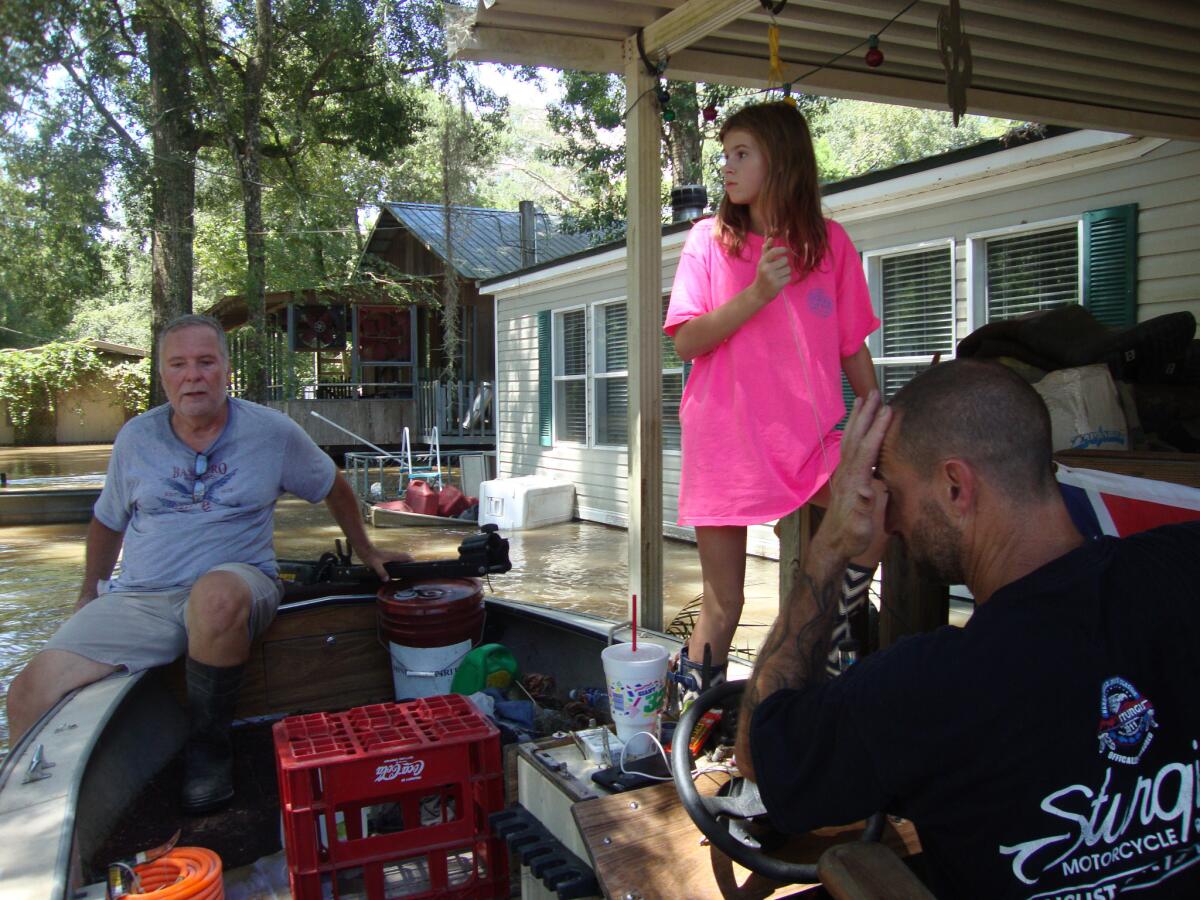
Phillips has flood insurance and plans to rebuild — and he’ll make sure the house, already elevated 4 1/2 feet off the ground, is even higher. “It’s going to get raised. I’m not going to live like this no more. It’s too nerve-wracking,” he said.
On the porch, London passed a “Welcome to Da River” sign, some American flags and a Confederate flag (nearly every house here has one, including Boogaerts’) to check on her stranded black-and-white cat, Angel. They made sure he had food before setting off.
On the way back, they saw a snake in the water, and debated whether it looked venomous. London worried aloud about looters. Her grandfather reassured her: “There’s no riffraff back here.”
Soon after, the motor sputtered. Boogaerts wondered whether they had run out of gas.
“How are you going to get out of here? We’re going to hit another mailbox!” London said.
“I’m not even sure that was a mailbox,” he replied.
Then the motor caught and came back to life. London spent the rest of the trip pointing out displaced items in the water, which showed no signs of receding: a refrigerator, a washing machine, a gas tank.
She and her grandparents would spend the night at the nearby Pelican Inn. As Boogaerts pulled up to where they had left their trucks, a text arrived from London’s grandmother.
She had wanted them to leave a note on the house asking officials not to break down the door like they did in New Orleans after the hurricane, when FEMA marked houses with an “X” — search codes noting what was found inside and symbols that became known as “Katrina crosses.”
Phillips reassured his granddaughter that this time, they wouldn’t have to do that. The damage was not as bad as he had feared, not as bad as the homes of others who waited anxiously along the road for Boogaerts to take them out just as soon as he found some more gas.
Twitter: @mollyhf
ALSO
Justice Department will phase out private prisons
Video images reveal filthy, crowded conditions in Border Patrol holding cells
Before Trump, Americans hadn’t worried this much about nuclear weapons since the Cold War
More to Read
Sign up for Essential California
The most important California stories and recommendations in your inbox every morning.
You may occasionally receive promotional content from the Los Angeles Times.
